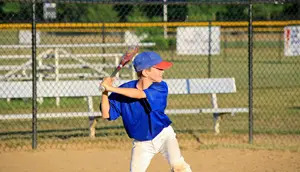The pressure to perform in a sport like baseball, even in Little League, can cause some players to neglect learning the basic skills. Read advice from the experts on how to help your child excel in baseball while still having fun.
 As a Little Leaguer, nothing frightened me more than the ball itself. Needless to say, I was a lousy baseball player. But then, sometime around the second grade, my life as a ballplayer changed forever when I got my first pair of glasses. With my vision corrected I began to play with more confidence and my fear of the stitched hardball quickly disappeared. For me, a quick trip to the eye doctor was all it took to improve my game exponentially.
As a Little Leaguer, nothing frightened me more than the ball itself. Needless to say, I was a lousy baseball player. But then, sometime around the second grade, my life as a ballplayer changed forever when I got my first pair of glasses. With my vision corrected I began to play with more confidence and my fear of the stitched hardball quickly disappeared. For me, a quick trip to the eye doctor was all it took to improve my game exponentially.
Sometimes it only takes the addition of a pair of glasses to improve a child’s enjoyment of a sport, but often it’s more complicated than that. The pressure to perform from both peers and parents, along with a general sense of unfamiliarity with a sport, can sour a lot of kids before they even give the sport a try.
Brian Dorsey, an instructor at Long Island’s Play Like a Pro Baseball since 2004, thinks the most important thing parents can do to improve their young child’s enjoyment and performance of the game is simple repetition of skills. “Believe it or not, just playing catch on a consistent basis with your children can make a huge difference in their game from year to year. Helping them to use a batting tee on a consistent basis is also another great tool to help improve their game. Any form of skill practice will go a long way when we talk about the young baseball players of today.”
A former standout pitcher for St. John University’s Division I team, Dorsey has seen an unsettling trend away from the skill-based practices of yesteryear, resulting in a lack of consistency in youth baseball. The biggest culprit, according to Dorsey, is the focus on competition in American youth baseball, “Coaches are scheduling more league and tournament games than ever before. This takes away from their important practice time. Competition is great, but it has to be in moderation at the youth level. We have begun to water down their competition experiences and take away from their practice time. Coaches should be taking a more ‘practice first’ approach at the younger levels. There will be plenty of time to compete when they get older.”
And bad habits don’t die easily. Joseph DiMauro, a Westchester physical education teacher and baseball instructor, finds an overall lack of fundamentals in the young teens that he coaches, which he says can be traced to their experience in Little League. “Like it or not, baseball is a game of details. We’ll often spend our time teaching the proper way to throw and hit to kids that should have learned proper technique long ago. The very best players come in with the fundamentals mastered, and it shows.” The importance of building solid technique at a young age is perhaps more important in baseball than in any other sport. As DiMauro points out, “kids can get by on athleticism in Little League, but as they get older the players without proper form are forced to start from scratch.”
In a sport where repetition is paramount, it’s sometimes a challenge to keep kids engaged in the skills exercises so important to their development. Some parents and coaches are developing programs that focus on a nonthreatening environment without the pressure to win. As Dorsey keenly points out, “Nothing is more important at the younger level then promoting a positive and fun environment. If their initial experiences are negative there is a good chance their outlook on the game will also follow with negative feelings.”
As the level of competition becomes more intense, so too does the passion of parents on the sidelines, which is not always a good thing. Ratcheting up the pressure on a child to perform is almost always a bad idea, but it is especially unwise for the parents of young baseball players. As DiMauro points out, “There are very few situations in other sports that match the pressure of being at-bat in a baseball game.” Taking a supportive, laid-back role is advised, but that doesn’t mean parents shouldn’t get involved in their son or daughter’s games. The President’s Council on Physical Fitness and Sports suggests parents encourage their children to set personal goals for improvement, keeping the tone of activities light and fun in order to sustain participation. Appropriate goals might be to get a hit or two in a game, not bat for a .300 batting average over the season. So get involved-the first step in assuring that your child is receiving positive reinforcement is to meet coaches and instructors and ideally watch a practice or two to observe the style of instruction.



















